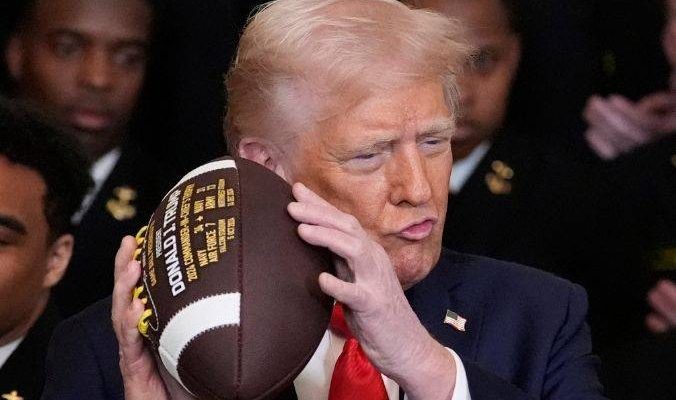**What Trump Said: “I Would Block Washington Commanders’ Stadium Deal”**
Former President Donald Trump has once again inserted himself into the world of sports and politics, this time targeting the Washington Commanders’ potential stadium deal. In a recent statement, Trump declared that he would block the franchise from securing a new stadium if he were in a position to do so, reigniting debates about the intersection of sports, business, and political influence. His comments have drawn strong reactions from fans, politicians, and analysts, raising questions about the future of the Commanders’ stadium plans and the broader implications of political interference in sports infrastructure projects.
Trump’s opposition to the Commanders’ stadium deal appears rooted in his long-standing feud with the NFL team, particularly over its 2020 name change from the Washington Redskins to the Washington Football Team (and later, the Commanders). Trump has repeatedly criticized the name change, framing it as an example of “cancel culture” run amok. His latest remarks suggest that his grievances extend beyond symbolism and into the realm of economic policy, as he threatens to derail the team’s efforts to secure a new home stadium—a project that could have significant financial and cultural implications for the Washington, D.C. area.
The Commanders have been exploring options for a new stadium for years, as their current home, FedEx Field in Landover, Maryland, has been widely criticized for its aging infrastructure and poor fan experience. Team ownership has considered sites in Virginia, Maryland, and Washington, D.C., with each location offering different incentives and challenges. A new stadium could bring billions in economic development, jobs, and tourism, making it a highly sought-after project for local governments. However, Trump’s vow to block any deal adds a new layer of complexity to an already contentious process.
Trump’s influence over such a deal would depend largely on his political power. If he were to return to the presidency in 2025, he could theoretically use federal leverage—such as withholding permits, opposing funding mechanisms, or applying political pressure—to obstruct the project. Given that stadium deals often involve public financing, land use agreements, and infrastructure support from various levels of government, a hostile administration could create significant roadblocks. His statement raises concerns about whether major sports projects could become politicized in an era of increasing polarization.
Critics argue that Trump’s stance is less about policy and more about personal vendettas. His history with the NFL has been fraught with conflict, dating back to his public attacks on players who knelt during the national anthem to protest racial injustice. By targeting the Commanders, he may be appealing to his base, which often views corporate and cultural changes—such as the team’s name change—as symbols of progressive overreach. However, others warn that using political power to punish a private business sets a dangerous precedent, blurring the lines between governance and retaliation.
Supporters of the Commanders, including local officials and business leaders, have pushed back against Trump’s comments, emphasizing the economic benefits of a new stadium. Virginia Governor Glenn Youngkin, for instance, has expressed interest in bringing the team to his state, seeing it as an opportunity for job creation and revenue growth. Similarly, D.C. Mayor Muriel Bowser has advocated for keeping the team in the nation’s capital, arguing that a modern stadium could revitalize neighborhoods and boost tourism. If Trump were to actively oppose these efforts, it could spark legal and legislative battles over local versus federal authority in development projects.
Beyond the immediate stadium debate, Trump’s remarks highlight a broader trend of politicians wielding influence over sports as a cultural battleground. From debates over team names and mascots to controversies surrounding public funding for stadiums, sports franchises increasingly find themselves at the center of political fights. The Commanders’ situation is particularly charged because of the team’s history, its symbolic importance to the D.C. region, and the financial stakes involved.
For the Commanders’ ownership group, led by Josh Harris, Trump’s comments present both a challenge and a rallying point. Harris, who purchased the team in 2023, has made it a priority to secure a new stadium and rebuild the franchise’s reputation after years of scandals under previous ownership. If Trump’s opposition galvanizes local leaders and fans to push harder for a deal, it could accelerate negotiations. Conversely, if political interference creates uncertainty, potential investors and partners may hesitate, delaying progress.
As the 2024 election cycle heats up, Trump’s stance on the Commanders’ stadium could become a talking point in his campaign, particularly as he seeks to solidify support among voters who see themselves as defenders of traditional American symbols. Meanwhile, Democrats and stadium advocates may frame his opposition as an abuse of power, arguing that economic development should not be held hostage to political grudges.
Ultimately, the fate of the Commanders’ stadium will depend on a mix of economic, political, and logistical factors. While Trump’s comments introduce a new variable, they are unlikely to be the sole deciding factor. Local governments, team ownership, and the NFL will all play critical roles in determining where and how a new stadium is built. However, Trump’s intervention ensures that the debate will remain in the spotlight, fueling discussions about the role of politics in sports and the limits of executive influence over private enterprise.
In the coming months, as the Commanders continue their search for a stadium solution, all eyes will be on how political dynamics shape the process. Whether Trump’s threats materialize into concrete action remains to be seen, but one thing is clear: the intersection of sports and politics has never been more contentious—or more consequential.



